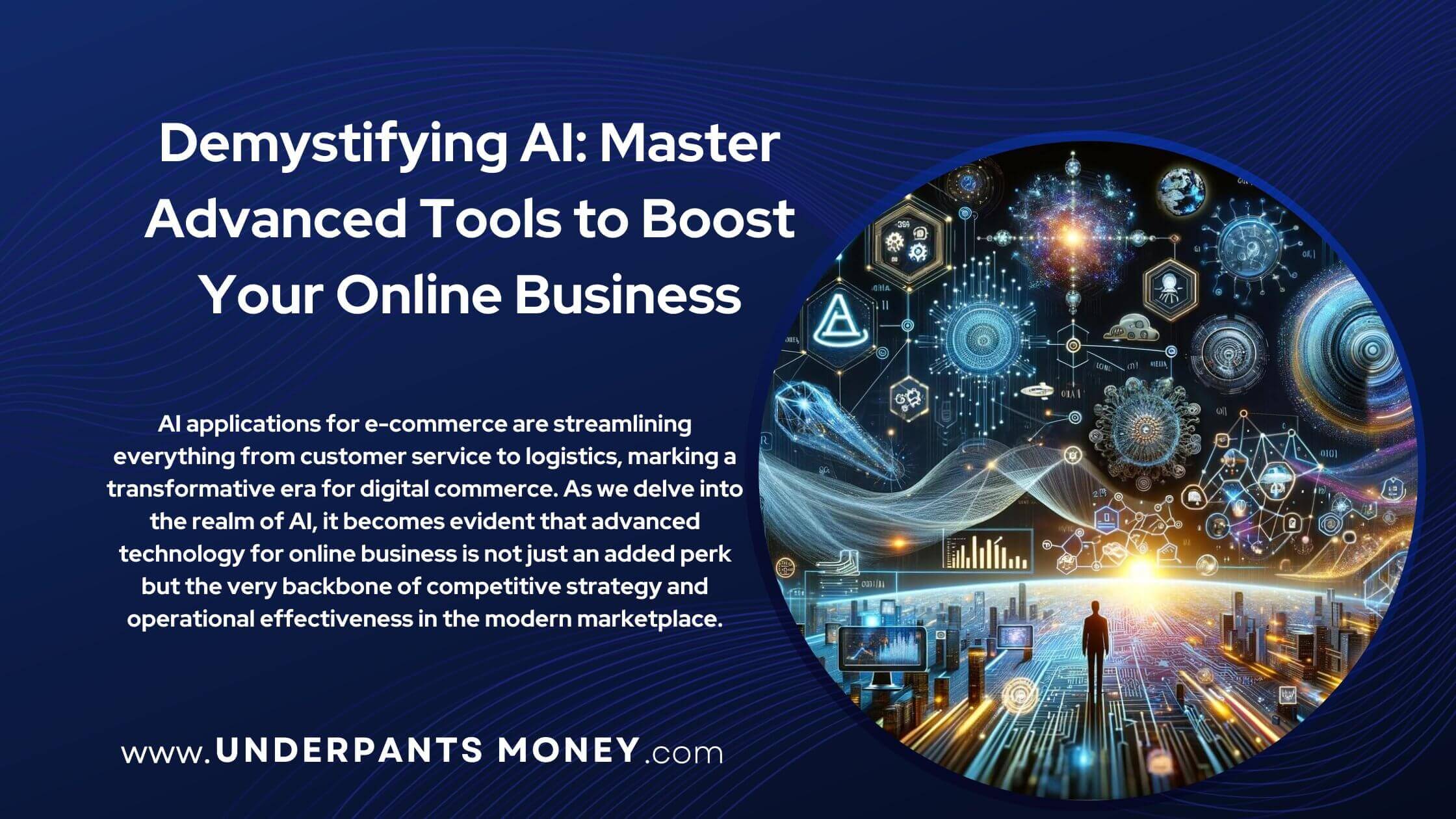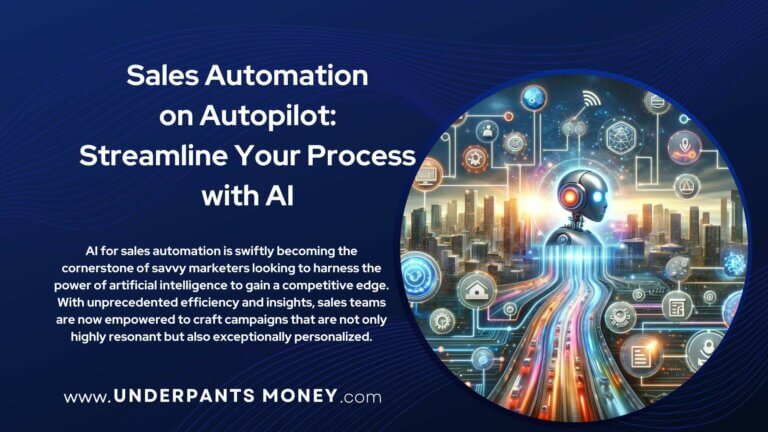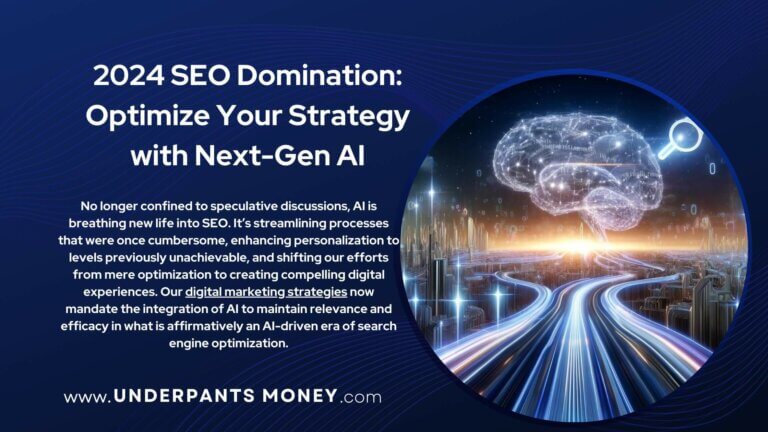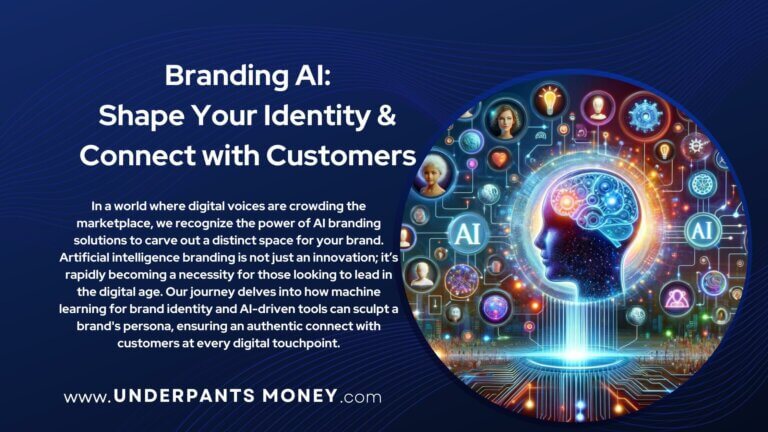Demystifying AI: Master Advanced Tools to Boost Your Online Business

Imagine a world where 37% of organizations have already implemented artificial intelligence in some form—a staggering statistic from Gartner that exemplifies the scale at which AI is revolutionizing industries. We operate in an age where artificial intelligence solutions are no longer futuristic concepts, but essential instruments propelling online businesses to new heights. AI applications for e-commerce are streamlining everything from customer service to logistics, marking a transformative era for digital commerce. As we delve into the realm of AI, it becomes evident that advanced technology for online business is not just an added perk but the very backbone of competitive strategy and operational effectiveness in the modern marketplace.

ChatsGPT, a shining example of online business AI tools, showcases the impressive capabilities of advanced algorithms that learn and adapt from massive data sets. These intelligent systems are not static; they evolve by processing and understanding data patterns, much like a phone’s autocorrect learns from our typing habits over time. Businesses are already leveraging AI models like Convolutional Neural Networks for sophisticated image analysis tasks, a practice that is becoming increasingly common in industries such as healthcare diagnostics and product cataloging. To illustrate, Pinterest’s revolutionary visual search tool is a testament to this technology’s potential. Furthermore, giants like Netflix and NVIDIA are harnessing the power of Recurrent Neural Networks for personalized user recommendations and Generative Adversarial Networks to create strikingly realistic graphics. The burgeoning field of AI in business is exemplified by Transformer Models, such as GPT-4, which are providing companies with the tools for content creation, customer service, and language translation, amplifying efficiency and innovation in operations like Ah-a Moment’s use of OpenAI’s GPT-4 for summarizing complex customer data sets.
Key Takeaways
- Artificial intelligence is a game-changer, already implemented by over a third of organizations globally.
- AI tools, such as ChatsGPT, are essential for online businesses to enhance decision-making and optimize operations.
- Convolutional Neural Networks are pivotal in tasks like image analysis, as demonstrated by Pinterest’s visual search tool.
- Recurrent Neural Networks and Generative Adversarial Networks power personalized experiences and content creation in platforms like Netflix and NVIDIA.
- Transformer Models like GPT-4 offer multifaceted applications, from content generation to data summarization, driving business innovation forward.
Understanding AI and Its Impact on Digital Businesses
As we delve into the transformative world of artificial intelligence (AI), it’s crucial to grasp how its inherent capabilities are shaping the landscape of digital business enhancement. Beyond the fictional portrayals, AI is a tangible powerhouse driving online business optimization and introducing smart business solutions. Here, we will dissect AI’s definition, its historical context, and the foresight of influential leaders regarding its potential to foster online business automation and growth.
Defining Artificial Intelligence and its Capabilities
Artificial intelligence is the engineering marvel that grants machines the ability to undertake tasks characteristic of human intellect. This includes learning from experiences, engaging in complex reasoning, and comprehending nuanced languages. Today’s businesses benefit immensely from AI’s non-sentient forms like chatbots, which rely on natural language processing to interact seamlessly with users – a pivotal step towards smart business solutions and enhancing the user experience.
Historical Perspective: AI in Literature vs. AI in Reality
The disparity between literary imaginations of AI and its actual state is pronounced. While the former often envisions AI as humanoid robots embroiled in ethical conundrums, the latter is grounded in practicality. Modern AI primarily consists of algorithms and systems designed to improve efficiency and automate tasks within the digital sphere, contributing significantly to the optimization of online businesses.
The Obama Administration’s Vision of AI’s Future Impact
The previous U.S. administration under President Obama acknowledged AI’s burgeoning influence on both professional and private realms. Their vision encapsulated a future where AI spawns monumental changes across industries, foreseeing a new era of innovation and competitiveness. It’s this anticipation of AI’s capabilities that solidifies its role in digital business enhancement and online business automation.
Embracing the remnants of this vision, we continue to witness AI’s expansive role in revolutionizing market landscapes, introducing unprecedented levels of efficiency, and opening doors to a myriad of intelligent business solutions. As AI intertwines more deeply with our business processes, it becomes the engine propelling the digital economy forward, nurturing environments where human ingenuity and machine precision coalesce to redefine what we thought possible in business and beyond.
Exploring Different AI Models Crucial for Online Business
In the dynamic world of digital commerce, understanding the intrinsic value of AI tools for online business is paramount. As we delve into various AI models, it’s essential to recognize how they act as the backbone of numerous technological advances. Each model brings a unique set of capabilities tailored to improve and refine specific sectors of an online enterprise.
CNNs, RNNS, and GANs – What Are They?
For instance, Convolutional Neural Networks (CNNs) have become indispensable in interpreting visual data. Their skill in image assessment is leveraged across diverse activities, from streamlining product categorization to enhancing the precision of medical evaluations. Meanwhile, Recurrent Neural Networks (RNNs) excel in managing sequential information, making them ideal for forecasting market trends and enabling sophisticated customer interactivity through chatbots.
However, it’s the Generative Adversarial Networks (GANs) that play a pinnacle role in the creative realm of design and marketing. By generating innovative product visuals and advertisements, they foster a culture of creativity that is both unique and engaging. In the context of linguistic processing and generation, transformer models such as GPT-4 offer remarkable functionalities. They aid in content generation, automated customer service, and multilingual translations, thus propelling operational efficiency and global reach.
- Machine Learning Tools: Serve as the architects of predictive models and analytical engines.
- AI Tools for Online Business: Become the facilitators for customer engagement and service enhancement.
- Artificial Intelligence Solutions: Act as the enablers of intelligent automation and decision-making processes.
Indeed, these AI models are not just academic concepts but practical tools that drive online business success. Their application is a testament to the agility and foresight with which businesses can approach the marketplace’s ever-evolving demands.

In our journey to embrace these artificial intelligence solutions, we must acknowledge the complexity and diversity of machine learning algorithms and their real-world implications. As businesses strive to remain competitive and innovative, the strategic implementation of AI models can provide an edge in a market where personalization, efficiency, and foresight are keys to sustainable success.
Online Business AI Tools: Transforming E-commerce with Smart Solutions
As we delve into the landscape of e-commerce, it’s clear that AI tools for online business are playing a pivotal role in transforming the industry. These powerful solutions are changing the game by providing e-commerce automation and AI-powered insights, leading to remarkable enhancements in business efficiency and customer experiences.
Key AI Tools for Online Business Enhancement
Embracing AI brings a wealth of benefits to online enterprises. Advanced algorithms capable of learning and predicting customer preferences are crucial for creating personalized shopping experiences. By incorporating AI tools, we’re not only seeing smarter search results but also dynamic pricing models that adapt to market demand in real-time. Automation of customer service through intelligent chatbots ensures queries are handled effectively, which increases customer satisfaction and loyalty.

Integrating AI in Everyday Business Operations for Optimization
The scope of online business automation spans well beyond customer-facing services. By integrating these advancements into backend operations, businesses gain substantial efficiencies. Inventory management systems now predict stocking needs, and supply chain bottlenecks are quickly identified and addressed through AI logistics platforms. This operational foresight afforded by AI is vital for maintaining a competitive edge.
Case Studies: Successful AI Implementation in Online Retail
We have observed the substantial impact of AI on industry leaders. For example, NVIDIA’s use of AI in enhancing the shopping experience through visual recommendations has set a high bar. Pinterest’s similar integration of AI for product discovery showcases how these tools can significantly boost marketing strategies. The automated systems collect and analyze massive amounts of user data, providing businesses with actionable insights and a deep understanding of consumer behavior.
AI Applications for E-commerce: Beyond Chatbots
As we dive deeper into the realm of e-commerce, it’s evident that artificial intelligence solutions offer much more than the conversational abilities of chatbots. In fact, machine learning tools are reshaping the future of online business optimization. IBM’s Watson is a prime example of machine learning in action, processing extensive data sets to forecast trends and tailor online shopping experiences with impressive precision.

The true power of AI in e-commerce automation lies in its capacity to mimic and enhance human decision-making processes. Neural networks analyze patterns within enormous data volumes, enabling businesses to anticipate consumer needs and behaviors. These insights inform inventory management, customer service, and personalized shopping experiences, fostering an environment ripe for growth and innovation.
Let us examine the impacts of these technologies through the lens of neural networks and predictive algorithms:
| Technology | Use-Case | Impact on E-commerce |
|---|---|---|
| Machine Learning Algorithms | Predictive Analytics | Forecasts consumer behavior to optimize stock levels and product recommendations. |
| Neural Networks | Customer Data Analysis | Enables hyper-personalized experiences through deep data-driven insights. |
| AI Chatbots | Customer Service Automation | Provides 24/7 assistance, reducing operational costs while improving user engagement. |
| Predictive Algorithms | Personalization of Shopping Experiences | Leverages past shopping behavior to curate individualized product arrays and promotions. |
It’s clear that organizations which harness these artificial intelligence solutions are not only automating routine tasks but are also enhancing their capabilities to connect with customers on a deeper level. As machine learning tools become increasingly integrated into the fabric of e-commerce platforms, the optimization of online businesses escalates, paving the way for a new era of automated, efficient, and personalized commerce.
Artificial Intelligence Solutions: Automating for Efficiency and Growth
As we delve into the transformative power of AI, it’s evident that machine learning tools are fundamental in reshaping the landscape of digital business enhancement. Our commitment to leveraging smart business solutions and advocating for online business automation positions us at the cusp of an efficiency revolution.
Machine Learning for Predictive Analytics and Personalization
Machine learning stands at the forefront, enabling businesses to harness predictive analytics, generating insights that fuel data-driven decisions. It allows us to craft highly personalized experiences for users by analyzing their behavior patterns and preferences. This targeted approach not only bolsters engagement but also significantly boosts conversion rates.
Digital Assistants in Administrative Operations
Take Amazon’s Alexa, a prime example of smart business solutions seamlessly integrating into our day-to-day workflow. These digital assistants are revolutionizing administrative operations, managing routine tasks with a level of precision and efficiency once unimaginable, freeing human talent to focus on more complex projects.
AI in Market Analytics: Understanding Consumer Behavior with Data
In the realm of market analytics, AI’s capability to dissect large datasets uncovers nuances in consumer behavior. By translating this quantum of data into actionable insights, businesses can anticipate market trends and adapt strategies that resonate with evolving consumer demands.
| AI Application | Benefits | Industry Examples |
|---|---|---|
| Predictive Analytics | Forecasting trends, personalizing customer engagement | E-commerce platforms, Financial services |
| Digital Assistants | Improving task efficiency, enhancing customer service | Smart homes, Corporate environments |
| Market Analytics | Targeted marketing, strategic planning | Retail, Online advertising |

Our pursuit of innovative AI implementations has not only redefined the efficiency paradigm but also planted the seeds for sustainable growth in the digital era. We stand at the helm, championing the integration of machine learning tools and smart business solutions that pave the way for tomorrow’s success in online business automation.
Conclusion
Throughout our exploration of artificial intelligence solutions in the realm of online business, we have witnessed the impressive evolution of AI from simple automated responses to complex, predictive analytics. Employing advanced technology for online business does more than just streamline processes; it reshapes the way we engage with customers, interpret data, and approach decision-making. With AI tools like Convolutional Neural Networks (CNNs), Recurrent Neural Networks (RNNs), and Generative Adversarial Networks (GANs), our capabilities have broadened, allowing for precise and efficient handling of tasks across various domains.
As we delve deeper into the digital age, it’s clear that advanced transformative models—including the likes of GPT-4—have revolutionized online platforms, redefining digital business enhancement. By harnessing cutting-edge machine learning tools, businesses are crafting highly personalized experiences for users, ensuring that every interaction is as unique as the individual behind the screen. This level of personalization coupled with increased operational efficiency is what sets apart thriving online ventures from those that stagnate.
Our journey does not end here, for the landscape of online business optimization is continually shifting, prompted by the inexhaustible potential of AI. As we embrace these technological advancements, we place ourselves at the forefront of innovation—poised to capture growth opportunities and carve a formidable niche in the competitive digital marketplace. It is a thrilling era for e-commerce, and by leveraging the full spectrum of artificial intelligence solutions, we are navigating towards a future where the symbiosis of AI and business is not just beneficial, but foundational.
FAQ
What is Artificial Intelligence (AI) and how can it enhance an online business?
AI is a branch of computer science that enables machines to mimic human-like cognitive functions such as learning, problem-solving, and language processing. In an online business context, AI can enhance operations by automating tasks, providing deep customer insights, personalizing shopping experiences, and improving decision-making processes.
How have perceptions of AI evolved from literature to real-world applications?
While early literature often presented AI as omnipotent robots or androids, real-world applications are more practical and grounded. Today, AI is typically deployed in the form of intelligent algorithms and machine learning models that handle data analysis, optimization tasks, and automate customer service through chatbots and other digital tools.
What was the Obama Administration’s viewpoint on the impact of AI in the future?
The Obama Administration acknowledged the transformative potential of AI across various sectors and envisioned it could lead to significant advancements in efficiency, productivity, and individual quality of life. They recognized AI’s role in potentially reshaping industries and the labor market.
What are some types of AI models crucial for online business?
Key AI models include Convolutional Neural Networks (CNNs) for image and video analysis, Recurrent Neural Networks (RNNs) for sequential data and natural language tasks, Generative Adversarial Networks (GANs) for creative design and content production, and Transformer models like GPT-4 for language understanding and content creation.
How is artificial intelligence transforming e-commerce?
AI is transforming e-commerce by personalizing the shopping experience, predicting consumer behavior, optimizing inventory and pricing strategies, and streamlining customer service with intelligent chatbots. This leads to enhanced user satisfaction and improved business efficiency.
How do AI tools integrate into everyday business operations for optimization?
AI tools integrate into business operations by automating routine tasks, reducing errors, providing actionable insights, and facilitating real-time decision-making. For example, AI can aid in supply chain logistics, targeted marketing, fraud prevention, and customer relationship management.
Can you provide examples of AI implementation in online retail?
Companies like Amazon use AI for product recommendations and optimizing their logistics network. Netflix employs AI to tailor content suggestions to individual user preferences. Pinterest utilizes machine learning for image recognition to improve search functionality and product discovery.
What goes beyond basic AI chatbot applications in e-commerce?
Beyond chatbots, AI in e-commerce includes systems like IBM Watson for data-driven insights, facial recognition for improved security, machine learning algorithms for dynamic pricing, and AI-powered virtual fitting rooms to enhance the shopping experience.
In what ways does machine learning contribute to business efficiency and growth?
Machine learning contributes by enabling predictive analytics for better forecasting, personalizing customer experiences based on behavior, optimizing marketing strategies through data analysis, and enhancing operational automation to reduce costs and maximize revenue.
How do digital assistants leverage AI in administrative operations?
Digital assistants like Amazon Alexa and Google Assistant use AI to help with scheduling, email management, setting reminders, and performing internet searches, thereby freeing up human resources to focus on more strategic work.
How is AI used in market analytics to enhance consumer behavior understanding?
AI is used in market analytics through data mining, sentiment analysis, customer segmentation, and purchase pattern analysis. These methods help businesses anticipate consumer needs, tailor marketing campaigns, and create more targeted and efficient strategies.






